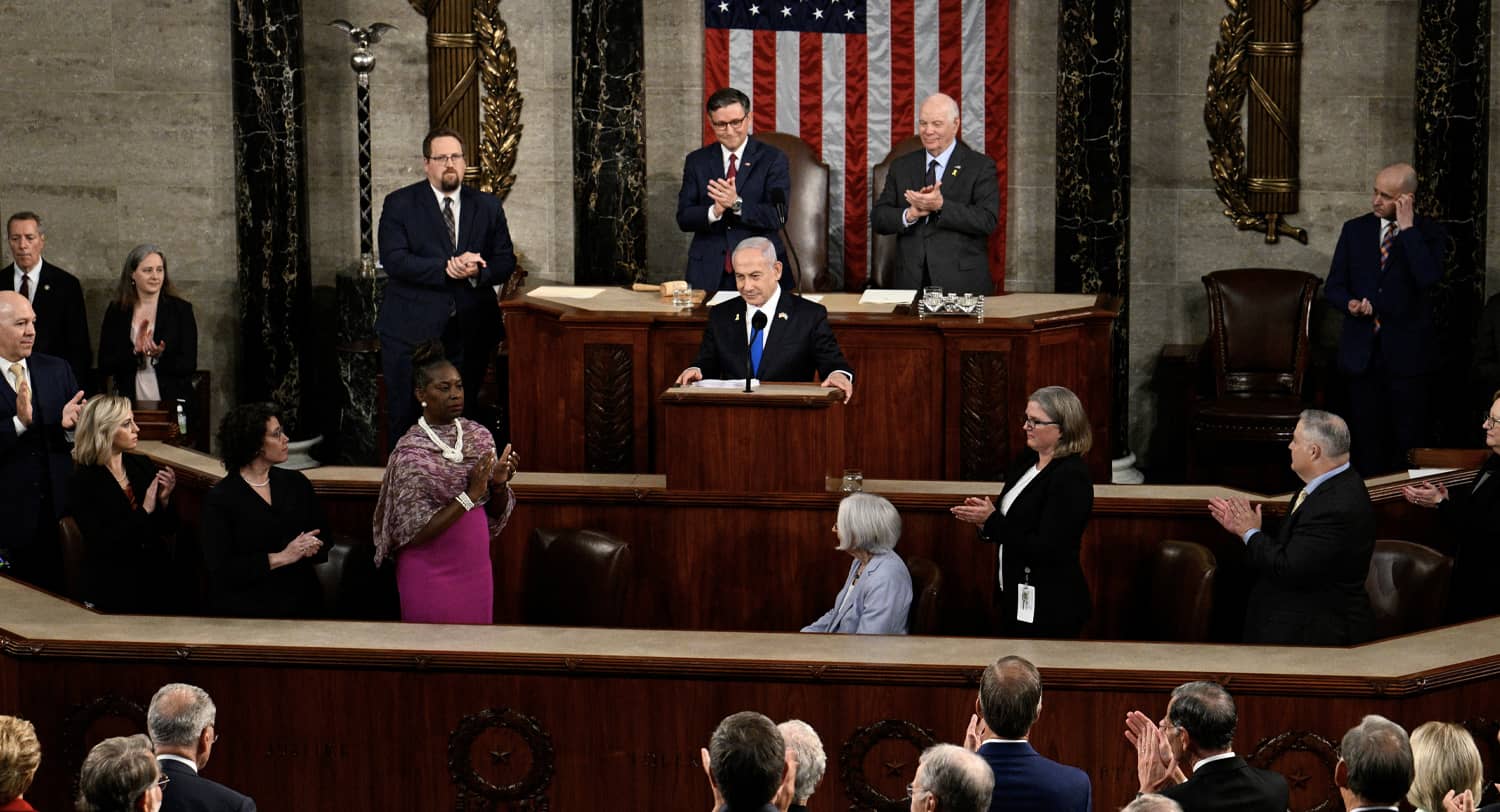The practice of inviting foreign leaders to address Congress goes back to 1824 with Revolutionary War hero the Marquis de Lafayette. But the person most frequently honored with such an invitation, four times to date, is Israel’s Prime Minister Benjamin Netanyahu. On July 24, he spoke to a joint session of the House and Senate as the embattled leader of a country fighting a multifront war now in its ninth month.
Anti-Israel protests have become de rigueur in the West during this war. In Paris, a group of pro-Palestine protesters mocked the Israeli Olympic soccer team in Parc des Princes stadium on Wednesday and wore white T-Shirts that spelled out “FREE PALESTINE.” A continent away, Netanyahu also encountered a hostile reception in Washington, DC. Hundreds of protesters, some waving Palestinian flags, congregated at Union Station and chanted pro-Hamas slogans as they burned an American flag.
Netanyahu was unfazed. Both the Washington Post and the New York Times used the word “forceful” to describe his address before Congress, which is a polite way of saying that he didn’t simply defend Israel’s actions in the Gaza Strip, but went on the offensive.
He said that the protestors were “useful idiots for Iran” and depicted as “utter nonsense” denunciations of Israel by the International Criminal Court and the United Nations. He cited US army colonel John Spencer, researcher in urban warfare at West Point, that Israel’s military conduct in Gaza exceeds the requirements of international humanitarian law. He placed the locus of evil in the Middle East on Iran: “When we fight Iran, we are fighting the most radical and murderous enemy of the United States,” he observed. “We’re not only protecting ourselves; we’re protecting you.” And he obliquely indicated that the prospects for a ceasefire and prisoner release might be in the offing, something that the Biden administration has been advocating for months, particularly as the election season heats up in America.
It was no accident, as Marxists used to say, that Vice President Kamala Harris, the presumptive Democratic nominee, did not preside over Netanyahu’s speech. The vice president, in the role of president of the senate, traditionally sits behind and above the podium of the person speaking at a joint session of Congress. Instead she was speaking at a campaign event in Indianapolis, even though the date of Netanyahu’s speech had been set weeks ago. Democratic senator Ben Cardin of Maryland, chair of the Senate Foreign Relations Committee, filled in for her.
President Joe Biden has paid a political price for his support for Israel, particularly in Michigan where his poll numbers have sagged. The Washington Post reports, “There is evidence that the war in Gaza has harmed Democrats more than Biden’s embarrassing debate performance. According to a recent Century Foundation poll, nearly 4 in 10 voters (38 percent) said they were less likely to vote for Biden due to his handling of Israel’s Gaza campaign. One in 3 independent voters expressed the same reluctance.” Minnseota’s uncommitted Democratic National Committee delegates are pledging that they will not support Harris unless she supports, among other things, a permanent ceasefire. How significant such threats are is an open question if as it now seems, Harris becomes the party’s champion against Donald Trump, seen as a mortal threat to American democracy. But they are a further sign that pro-Arab forces inside the Democratic party are becoming increasingly assertive and restless.
It is clear that Harris does not intend to go down the same road as Biden. Representative Pramila Jamaya, the head of the Congressional Progressive Caucus, recently stated that Harris has a “natural empathy for the situation of Palestinian Americans” and in March she referred to Gaza as a “humanitarian catastrophe.” At the same time, second gentleman Doug Emhoff appeared before several Jewish groups on a Zoom call to reassure them of Harris’s support for Israel: “The Vice President has been and will be a strong supporter of Israel as a secure democratic and Jewish state, and she will always ensure that Israel can defend itself, period. Because that’s who Kamala Harris is.” Both Biden and Harris are scheduled to meet with Netanyahu on July 25 in Washington.
Republicans capitalized on Harris’ apparent attempt to put daylight between her and Israel. “VPOTUS Harris’s snub of Netanyahu is petty and disrespectful,” wrote Senator John Cornyn on X. House speaker Mike Johnson originally put Democrats on the spot by inviting Netanyahu. A number of Democratic leaders, including former House speaker Nancy Pelosi, refused to attend Netanyahu’s address. Indeed, Pelosi reproached Netanyahu for failing to reach a ceasefire deal, calling his speech, “by far the worst presentation of any foreign dignitary invited and honored with the privilege of addressing the Congress of the United States.”
Meanwhile, Netanyahu is moving to fortify his ties with Trump, who remains the frontrunner in the presidential race. In his address, Netanyahu went out of his way to praise him: “”I… want to thank President Trump for all the things he did for Israel. From recognizing Israel’s sovereignty over the Golan Heights to confronting Iran’s aggression to recognizing Jerusalem as our capital and moving the American embassy there.”
Netanyahu’s relations with Trump have been rocky ever since he was one of the world’s first leaders officially to congratulate Biden on his victory, a move that Trump viewed as an unforgivable affront. In addition, Trump bashed Netanyahu over his refusal to participate in the 2020 mission to kill Iranian General Qasem Soleimani, who was planning an attack on Americans in Iraq. “I’ll never forget that Bibi Netanyahu let us down.”
Nevertheless, the electoral advantages for Trump to have a harmonious meeting with Netanyahu are likely too much to pass up. Forget the speech before Congress. A reconciliation with Trump could prove to be the most important result of the trip for Netanyahu.

